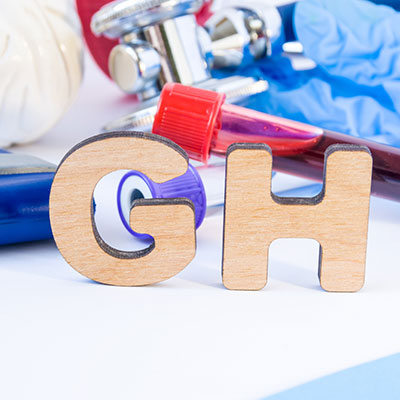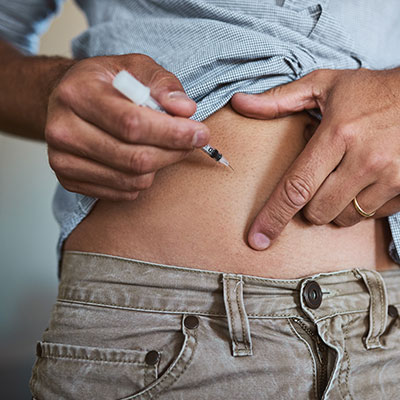What Is Growth Hormone Deficiency?

Growth hormone deficiency (GHD) is a recognized clinical condition by the medical establishment. GHD in adults most commonly persists from an untreated or ineffectively treated growth hormone deficiency in childhood. However, it can also develop in adulthood without any previous history of GHD. Most often, the cause of growth hormone deficiency in adults is the steady decline of HGH that occurs as men and women age.
Growth hormone is produced by the pituitary, a small gland at the base of the brain. A growth hormone deficiency occurs when for some reason, your pituitary is not making adequate supplies of HGH.
Growth hormone is essential for a child to grow into a healthy adult of full stature. However, even as adults, we still need growth hormone. In adults, HGH plays a vital role in your:
- Ability to build muscle
- Cardiovascular health
- Sexual health
- Bone health
- Fat metabolism
- Memory and concentration
Children with GHD fail to reach growth milestones. Adults with GHD will have poor quality of life issues related to the above list.
What Are the Symptoms of Human Growth Hormone Deficiency?
The signs and symptoms of growth hormone deficiency in adults, or age-related GHD, can include:
- A higher level of body fat, especially around the waist
- Anxiety and depression
- Decreased sexual function and interest
- Fatigue
- Sexual health issues
- Greater sensitivity to heat and cold
- Less muscle (lean body mass)
- Less strength, stamina, and ability to exercise without taking a rest
- Reduced bone density, greater risk of osteoporosis
- Changes in the makeup of the blood cholesterol.
People with adult-onset GHD also tend to be at a higher risk for cardiovascular disease because they tend to have higher levels of LDL (bad) cholesterol, as well as they also tend to have higher triglyceride levels.
What Are the Causes of Human Growth Hormone Deficiency?

Adults, as well as kids, can suffer from GHD. This is why doctors refer to two different categories or types of growth hormone deficiency:
- Child-onset GHD, which is present at birth or starts in childhood. It can be carried into adulthood.
- Adult-onset GHD, which develops in adulthood. Adult-onset GHD is sometimes also referred to as “age-related GHD.”
No matter when it occurs or what type of GHD it is, growth hormone deficiency is always the result of something that causes your pituitary not to make enough HGH. Poor pituitary function could be the result of genetic defects, disease conditions such as cancer, or disease or injury to the brain. GHD can also be affected by lower levels of other hormones, which influence pituitary function.
What Other Disorders are Related to Growth Hormone Deficiency?
Growth hormone deficiency in adults can cause a number of health issues. According to the clinical guidelines for GHD, the chief complaint is an alteration of “body composition,” as the patient with GHD will present with increased fat mass and decreased muscle mass. Further, the ability to exercise effectively is reduced, cholesterol levels may be increased, as is the risk of a cardiovascular incident, such as heart attack or stroke. Other signs and symptoms listed in the guidelines for adults with GHD include:
- Decreased sweating and poor thermoregulation
- Increased insulin resistance
- Increased cholesterol
- Increase build-up of cardiac plaque
- Mood swings increased anxiety and depression
- Drop in energy levels
- An overall sense of being unwell
In children, GHD is also associated with:
- Turner syndrome
- Noonan syndrome
- Primary growth hormone insensitivity (GHI), also known as Laron syndrome
- Small gestational age (SGA)
- Idiopathic Short Stature (ISS)
- Prader-Willi syndrome (PWS)
- Short stature homeobox-containing gene (SHOX) deficiency
What Are the Longer-Term Implications of Growth Hormone Deficiency?

Men and women with long-term GHD are at a greater risk of developing diabetes and heart disease.
Sexual health issues are not uncommon. Cognitive decline and a greater risk of developing dementia and Alzheimer’s disease can be long-term issues with untreated GHD, as can be depression and anxiety.
Over the long term ignoring symptoms of age-related growth hormone deficiency will continue to have an overall negative impact on your quality of life.
Standard Therapies for Growth Hormone Deficiency
There are specific guidelines for the treatment of growth hormone deficiency in adults.
Treatment guidelines for adults with GHD suggest that growth hormone therapy offers adults with GHD significant benefits. In addition, the treatment guidelines for adults with growth hormone deficiency suggest:
- Growth hormone therapy in adults improves cardiovascular health.
- Growth hormone therapy in certain adults with growth hormone deficiency may improve mortality rates.
- HGH therapy improves the quality of life of most adults with growth hormone deficiencies.
In addition to these guidelines provided by The American Society of Endocrinologists, many clinical studies have shown that the most effective treatment for growth hormone deficiency in adults is growth hormone replacement therapy. HGH replacement therapy is given via injections. The dosage of growth hormone used to treat adult-onset GHD will vary depending on your age, weight, medical history, lifestyle, and overall wellness goals.

There are different brands or types of growth hormone injections. However, they are all different doses of the prescription medication known as somatropin.
In adults suffering from growth hormone deficiency, HGH therapy has been proven to:
- Improve your ability to build lean muscle
- Improve your ability to burn fat, resulting in weight loss
- Boost your immune system
- Increase energy levels
- Improve your sex life
- Increase focus and mental acuity
- Provide more restful sleep
- Decrease feelings of anxiety and depression
What Results Can Expect From HGH Replacement Therapy
Most people will begin to see the results of growth hormone therapy within the first four weeks of treatment. Most initial growth hormone therapy is prescribed for six months. The following chart illustrates a month-by-month breakdown of the kinds of results you can expect from growth hormone replacement.
| MONTH | RESULTS OF GROWTH HORMONE THERAPY |
| After One Month | The effects of daily growth hormone injections will become apparent within a week or two. You will be sleeping better; you will see increases in your energy level and overall vitality. By the 3rd or 4th week, you will be thinking more clearly. |
| After Two Months | In month 2, more physical results will be seen. You will look notably more fit. You will have more lean muscle, and your skin will have an overall more youthful appearance. |
| After Three Months | After 12-14 weeks on growth hormone, you will look and feel much better than when you started. You will be stronger, more flexible; bone density will have improved so that you will feel less joint pain, and you should also see an improvement in libido and sexual performance. |
| After Four Months | After three months and into your 4th, fat loss and muscle gain will be very significant. You will be entering the period of peak results of growth hormone injections. |
| After Five Months | After month five, this is when most patients have their “before” and “after” pictures taken. Do not be surprised at what you looked like before you started growth hormone therapy. |
| After Six Months | After six months, you will be a stronger, healthier person. You will have received all of the many benefits of growth hormone therapy, such as:
|
Now that you know a lot more about growth hormone deficiencies, why not contact us today, and see if you can benefit from the life-changing benefits of HGH replacement therapy.
FAQ
What Is HGH?
Human growth hormone, or HGH, is a naturally occurring polypeptide hormone produced in the pituitary gland. It is the primary hormone that influences growth and development. Although HGH is critical in the process of a child growing normally into an adult, it still plays a vital role throughout our lives. HGH is vital to almost every metabolic process your body requires.
What Causes Growth Hormone Deficiency?
Any disease, injury, or genetic condition that impacts pituitary function can cause GHD. Adult-onset GHD can also result from the steady decline of growth hormone that occurs as men and women age.
How Do You Define Normal Growth in Children?
Growth rates vary considerably from child to child. But measured in height, average "normal" growth is often described as:
- 0-12 months: about 10 inches a year
- 1-2 years: about 5 inches a year
- 2-3 years: about 3½ inches a year
- 3 years to puberty: about 2 to 2½ inches a year
If your child is less than the third percentile in height for a child of his age, that can be a red flag for growth hormone deficiency.
Is HGH Therapy Legal?
HGH therapy is 100% legal and approved by the FDA for the treatment of children and adults who have been diagnosed with a growth hormone deficiency. However, it is illegal to use HGH WITHOUT a doctor's prescription. Using growth hormone without a doctor's prescription is not only against the law, but it can also be hazardous to your health.
You cannot legally buy HGH online or anywhere else without a doctor’s prescription. Getting a prescription for growth hormone therapy is not hard. It takes these five easy steps.
- Step 1 – Fill out an online medical history form – Filling out an online medical history form is the only step in getting HGH injections that can be done online. You cannot purchase real HGH online.
- Step 2 - See a doctor –If your medical history indicates that you need growth hormone therapy, the next step is to see a doctor. He or she will discuss your medical history in further detail, evaluate your symptoms, and take a complete physical exam.
- Step 3 – Laboratory hormone testing – Once the exam and evaluation by your doctor are completed, you will be referred to a laboratory to have the actual HGH level in your blood tested.
- Step 4 – Obtain a legal prescription for HGH injections - If the results of your laboratory tests indicate that you are growth hormone deficient, and based on your physical exam and medical history, your doctor will prescribe a brand of growth hormone injections that is most compatible with your symptoms and lifestyle.
- Step 5 – Your HGH injection package is delivered – Your prescription for injectable HGH will be forwarded to one of the pharmacies we work with. The pharmacy will then deliver your HGH therapy supplies to you per the doctor's instructions.
How Can I Find the Right HGH Therapist?
Any licensed medical doctor can write you a prescription for growth hormone therapy, but you should not get your HGH treatments from just any doctor. You should work with physicians like ours who specializes in treating men and women for age-related hormone deficiencies.
How Growth Hormone Treatment Works
Growth hormone therapy is designed to replace the HGH that your body is no longer making enough of. The benefits of HGH have been well-documented. Originally, HGH therapy was used mainly to treat children who were failing to achieve normal height. Since its discovery and original use, researchers have looked into other benefits of HGH -- specifically, its anti-aging properties for older men and women.
Which Is the Most Effective Type of HGH Therapy?
Authentic growth hormone therapy is ONLY available as injections. All of the growth hormone made by the major drug manufacturers in the US is some form of the prescription medication somatropin. It is only prescribed in an injectable form. There is no such thing as “over-the-counter” HGH or any kind of HGH that can be bought without a prescription. Any product claiming to be HGH, or contain HGH that is available in a pill, or a powder, or any other form than an injection, or could be purchased without a prescription – cannot, by law, be real HGH. Any such products can be avoided.
What Are the Different Types of HGH Injections?
All HGH injections are some form of somatropin. Somatropin is made from recombinant human DNA, so it is an exact duplicate of the HGH normally produced by your body. There are different brands of HGH injections available. These differ only in their dosages and injection methods. Some use traditional syringes; others use injectable pens or cartridges.
We only work with legitimate pharmacists that provide our patients with one of the name brands of prescription HGH.
The most popular brands of injectable HGH that can be bought online include:
- Genotropin
- Humatrope
- Omnitrope
- Norditropin
- Zomacton
- Saizen
- Serostim
What to Expect From Growth Hormone Treatment?
You can expect to see many benefits from growth hormone therapy, such as increased muscle mass, loss of fat, and renewed energy.
For men and women who have been diagnosed with age-related GHD, growth hormone injections have been found to:
- Improve fat metabolism, resulting in lower body mass index (BMI)
- Increase energy and stamina
- Provide more restful sleep
- Improve memory and other cognitive functions
- Decrease anxiety and return life to more of an “even keel”
- Increase libido and improve sexual performance
- Strengthen bones, and fight osteoporosis
In addition, HGH injections can also improve heart health by helping to reduce cholesterol and open blood vessels that have been clogged with arterial plaque.
What to Expect After Growth Hormone Treatment?
Growth hormone therapy is given for a course of about six months. After you have completed your first six-month program, you will be evaluated to see if you need to continue. Either way, you will be given lifestyle, diet, and fitness counseling which will help you to maintain the many great benefits you will have achieved from HGH injections.


